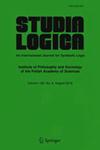克里普克伎俩的变体
IF 0.6
3区 数学
Q2 LOGIC
引用次数: 0
摘要
摘要 在20世纪60年代早期,为了证明包含经典谓词逻辑\(\textbf{QCl}\)的谓词模态逻辑子逻辑的单元片段的不可判定性,索尔-克里普克展示了带有二元谓词信的经典原子式如何能够被单元模态式所模拟。我们考虑了克里普克的模拟(我们称之为克里普克技巧)在克里普克未考虑的各种模态逻辑和超直觉谓词逻辑中的适应性。我们还讨论了克里普克诀窍不起作用的情形,在这些情形中,可以得到一元模态谓词逻辑的可解性。本文章由计算机程序翻译,如有差异,请以英文原文为准。
Variations on the Kripke Trick
Abstract
In the early 1960s, to prove undecidability of monadic fragments of sublogics of the predicate modal logic \(\textbf{QS5}\) that include the classical predicate logic \(\textbf{QCl}\) , Saul Kripke showed how a classical atomic formula with a binary predicate letter can be simulated by a monadic modal formula. We consider adaptations of Kripke’s simulation, which we call the Kripke trick, to various modal and superintuitionistic predicate logics not considered by Kripke. We also discuss settings where the Kripke trick does not work and where, as a result, decidability of monadic modal predicate logics can be obtained.
求助全文
通过发布文献求助,成功后即可免费获取论文全文。
去求助
来源期刊

Studia Logica
MATHEMATICS-LOGIC
CiteScore
1.70
自引率
14.30%
发文量
43
审稿时长
6-12 weeks
期刊介绍:
The leading idea of Lvov-Warsaw School of Logic, Philosophy and Mathematics was to investigate philosophical problems by means of rigorous methods of mathematics. Evidence of the great success the School experienced is the fact that it has become generally recognized as Polish Style Logic. Today Polish Style Logic is no longer exclusively a Polish speciality. It is represented by numerous logicians, mathematicians and philosophers from research centers all over the world.
 求助内容:
求助内容: 应助结果提醒方式:
应助结果提醒方式:


